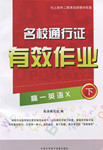题目内容
When you have a post-office box, the postman doesn’t bring letters to you, but you go to the post-office and get your letters and parcels from your box. The box is locked, only you have the key, so the letters and parcels are safe.
One day the headmaster of a school wrote to the post-office and asked for a post-office box for his school. He soon got an answer. It said, “We will give you a post-office box in one month.”
Three months later, the headmaster wrote to the post-office and said, “Why haven't we got a post-office box yet?”
This was the answer from the post-office:
“Dear sir,
We gave you a post-office box two months and wrote to you then to tell you. Here is the key to your box. You will find our letter to you in it.”
小题1:When you have a post-office box, _____.
小题2:The word “key” in this passage means _____.
小题3:The headmaster _____.
小题4:When the post-office said that you could get a post-office, he meant _____.
小题5:Which of the following might not be true?
One day the headmaster of a school wrote to the post-office and asked for a post-office box for his school. He soon got an answer. It said, “We will give you a post-office box in one month.”
Three months later, the headmaster wrote to the post-office and said, “Why haven't we got a post-office box yet?”
This was the answer from the post-office:
“Dear sir,
We gave you a post-office box two months and wrote to you then to tell you. Here is the key to your box. You will find our letter to you in it.”
小题1:When you have a post-office box, _____.
| A.it is easier for you to write letters | B.you will have more letters than parcels |
| C.you get your letters in front of your house | D.you got to the post-office to get your letters |
| A.邮件 | B.密码 | C.编号 | D.钥匙 |
| A.wrote many letters to the post-office | B.didn’t like the postman |
| C.didn’t know how a post-office box worked | D.forgot to pay for the post-office box |
| A.you may go to the post-office to get your mails |
| B.you must wait to get the post-office box |
| C.you must write again to get the key |
| D.you must pay for the box before you got it |
| A.If you want to get a post-office box, you must let the post-office know. |
| B.When you get a post-office box, you have to do the work of a postman. |
| C.You go to the post-office to get the key to your box. |
| D.After you get a post-office box, the post man will not send mails to your house. |
小题1:D
小题1:D
小题1:C
小题1:A
小题1:B
略

练习册系列答案
 名校通行证有效作业系列答案
名校通行证有效作业系列答案
相关题目
 (相比于) those who averaged six or seven hours. Those who slept eight hours or more in bed each night also showed a bigger fat gain - but it was less obvious than that seen in "short sleepers."
(相比于) those who averaged six or seven hours. Those who slept eight hours or more in bed each night also showed a bigger fat gain - but it was less obvious than that seen in "short sleepers." ep fit.
ep fit.  rent generation of TV-addicted kids is much smarter than we are? In my home, the only people who can work the remote control are the children.
rent generation of TV-addicted kids is much smarter than we are? In my home, the only people who can work the remote control are the children.  in
in David writes: I’m very sorry to say that I think it would be very unfair for me to help you win a competition--- unfair to the other competitors!
David writes: I’m very sorry to say that I think it would be very unfair for me to help you win a competition--- unfair to the other competitors! discussion group called ELTCSChi-L (English Language Teaching Contacts Scheme China List).
discussion group called ELTCSChi-L (English Language Teaching Contacts Scheme China List).